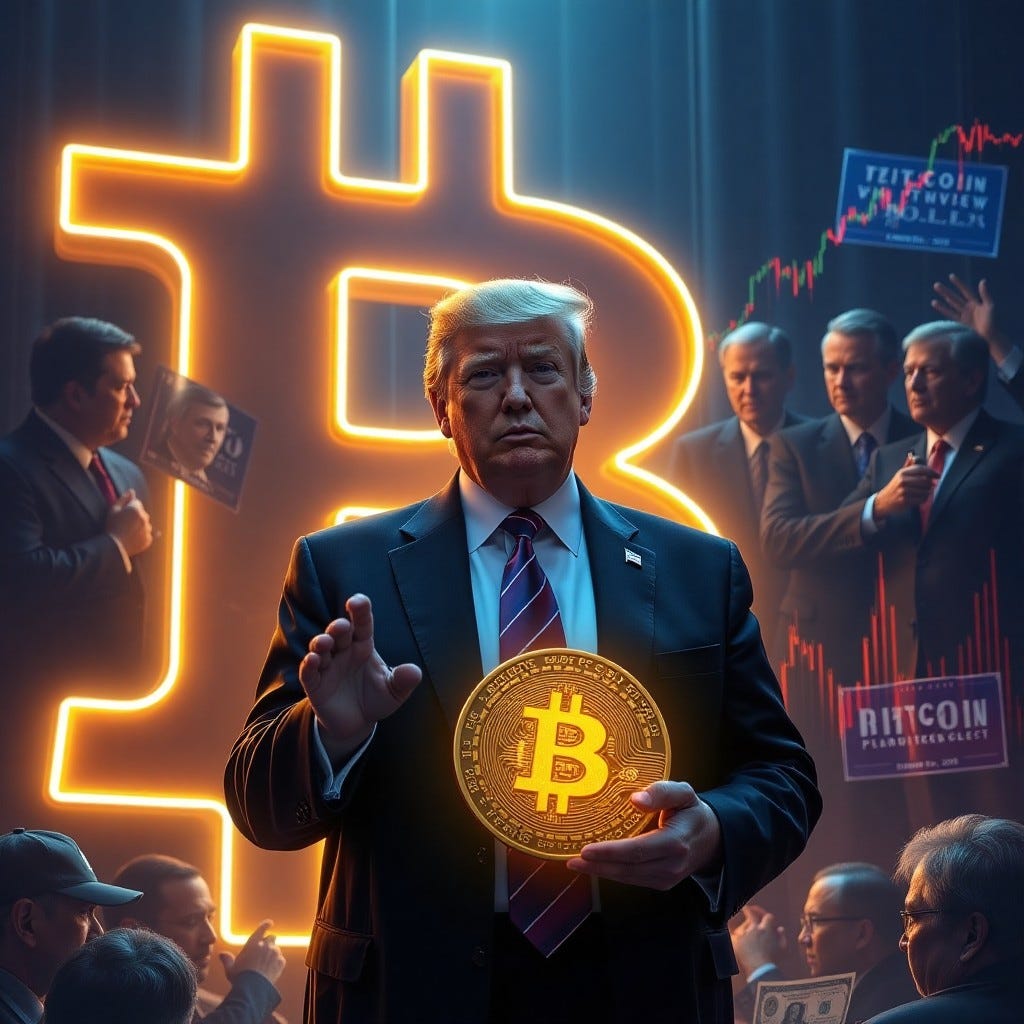The Ultimate Crypto Hustle & Con Job?
Trump’s Crypto Pivot: Strategic Move or Self-Enrichment?
Analysis: Trump’s Crypto Pivot—Strategic Move or Self-Enrichment?
From crypto critic to self-proclaimed 'crypto president,' Trump’s sudden embrace of cryptocurrency raises serious ethical and regulatory concerns. Is this a genuine policy shift or another case of political profiteering?
Cryptocurrency was originally conceived as a decentralized financial system, designed to operate outside the control of traditional governments and financial institutions. Bitcoin, the first and most well-known cryptocurrency, emerged in response to the 2008 financial crisis as a means of giving people financial sovereignty. The underlying technology, blockchain, enables secure and transparent transactions without the need for intermediaries, reducing dependence on banks and centralized authorities.
The core idea behind crypto was to empower individuals, allowing them to store and transfer wealth free from government manipulation, banking restrictions, and inflationary policies. However, as the industry evolved and attracted billions of dollars in investment, it also drew the attention of regulators, institutions, and now, powerful politicians like Donald Trump.
Former President Donald Trump’s reversal on cryptocurrency, from outright skepticism to full-fledged support, raises serious ethical and regulatory concerns. What was once a “scam” in his eyes has now become a central pillar of his administration’s economic strategy, benefitting both his family and his political allies.
From Critic to ‘Crypto President’
Trump’s skepticism toward cryptocurrency was well-documented. He had previously dismissed the industry as fraudulent and volatile, aligning with traditional regulatory perspectives. However, his campaign and subsequent administration saw a dramatic shift, heavily influenced by wealthy crypto donors and industry executives eager for deregulation.
Financial Backing: Crypto executives funneled tens of millions of dollars into Trump’s campaign and Super PACs, reportedly securing meetings where they could directly influence policy.
Regulatory Rollbacks: The SEC, under Trump’s direction, dropped numerous lawsuits against crypto companies, giving the industry a regulatory free pass.
Trump’s Own Crypto Profits: The former president personally launched a meme coin, $TRUMP, just before his inauguration, a venture that has reportedly generated hundreds of millions of dollars.
A Dangerous Precedent for Regulation
The relationship between Trump and the crypto industry represents a stark example of regulatory capture, where industry insiders gain influence over the very bodies meant to regulate them.
Conflict of Interest: Trump, his family, and close allies have direct financial stakes in the cryptocurrency market. His administration’s decisions on crypto policy, including deregulation and the establishment of a national Bitcoin reserve, directly impact his personal wealth.
Market Manipulation Concerns: Trump’s influence has already been felt in the crypto market. His mere suggestion of a strategic Bitcoin reserve sent Bitcoin’s value soaring by 9%. With insider knowledge, Trump-affiliated entities stand to profit immensely.
Erosion of Investor Protections: By rolling back regulations, Trump has weakened oversight that protects consumers from fraud and market instability. This could create a scenario similar to the 2022 FTX collapse, where lax oversight led to billions in investor losses.
The True Nature of Crypto: Decentralization vs. Elite Control
Cryptocurrency was originally envisioned as a decentralized financial system, free from government interference and corporate control. However, Trump’s embrace of crypto raises critical questions about whether the industry is still staying true to this vision.
Crypto’s Original Purpose vs. Its Current Reality:
Was crypto meant to empower individuals, or has it become just another tool for wealth consolidation and political leverage?
Does Trump's embrace of crypto strengthen decentralization or undermine it by reinforcing elite control?
The Irony of Trump’s Crypto Shift:
Before: He called it a scam.
Now: He profits off of it, while simultaneously rolling back regulations that once limited corruption.
Big Picture: Instead of embracing crypto’s ethos of decentralization, he is using regulatory power to shape the market in a way that benefits him and his allies.
Regulatory Capture and Institutional Control:
Is crypto still decentralized if government officials and billionaires control the major players?
Does Trump’s involvement signal a shift from grassroots crypto innovation to political and corporate dominance?
A Larger Warning for the Crypto Community:
Many crypto enthusiasts see Trump as a “pro-crypto president,” but does he actually support decentralization, or is he just using crypto as another financial tool for himself?
Are his policies about crypto freedom or crypto favoritism for insiders?
Implications for the U.S. Economy
The lack of clear regulations and Trump’s push for crypto-favorable policies present risks beyond personal gain:
National Security Risks: The crypto market has long been used for money laundering and illicit financing. Weakening oversight could make the U.S. financial system more vulnerable.
Economic Volatility: Encouraging government-held Bitcoin reserves could destabilize traditional markets, particularly if federal policy directly influences cryptocurrency value.
Foreign Influence: Reports indicate that foreign investors, including figures with ties to China, have poured money into Trump-affiliated crypto ventures. This raises questions about potential foreign influence in U.S. financial and political systems.
Conclusion: Strategic Leadership or Pure Opportunism?
Trump’s embrace of cryptocurrency appears less about fostering economic innovation and more about capitalizing on a lucrative financial opportunity. By leveraging his political position, he has turned the crypto industry into a personal cash machine while stripping away regulatory safeguards meant to protect consumers and markets.
His pivot on crypto should not be viewed as a mere policy shift but as an extension of a broader pattern: exploiting political power for financial gain. The question now is not just whether Trump supports crypto, but whether his policies are shaping a system where he and his inner circle profit while everyday investors bear the risk.




Terrifying